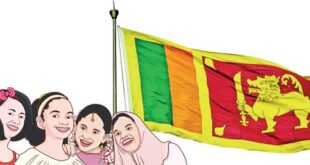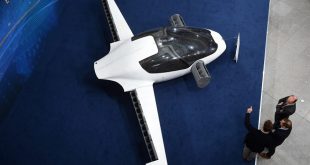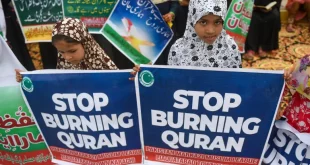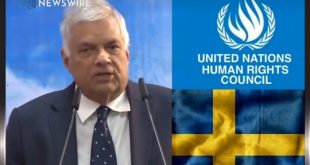TEHRAN (Dispatches) — UN atomic agency head Mohamed ElBaradei said here on Sunday that remaining differences between Iran and the world powers could be resolved through diplomacy after the two sides held talks in Geneva last week as he announced that UN experts will inspect Iran’s newly disclosed uranium enrichment plant on Oct. 25.
“The relation between Iran and the world powers is shifting from conspiracy to transparency and cooperation,” International Atomic Energy Agency chief Mohammed ElBaradei told a joint news conference with Iran’s nuclear chief Ali Akbar Salehi.
His visit followed a week of intense diplomatic activity surrounding Iran’s nuclear program. On Thursday, Iran and six world powers put nuclear talks back on track at a landmark session in Geneva that included the highest-level bilateral contact with the U.S. in years.
President Barack Obama’s national security adviser said Sunday that Washington was also pleased with the level of cooperation from Iran.
“For now, things are moving in the right direction,” James Jones said on CNN’s “State of the Union” program
ElBaradei said the ongoing international talks with Tehran were a “step in the right direction”.
ElBaradei said Iran had given the assurance that the International Atomic Energy Agency (IAEA) inspectors would be given access to the Fordu nuclear facility.
“IAEA inspectors will visit Iran’s new enrichment facility, under construction in Qom, on 25th of October,” he said.
“It is important for us to have comprehensive cooperation over the Qom site … It is important for us to send our inspectors to assure ourselves that this facility is for peaceful purposes,” ElBaradei said.
“There are concerns about Iran’s future intentions and this is not a verification thing,” he said. “We are concerned but we are in no way panicking about Iran’s nuclear program.”
ElBaradei also announced that officials from the United States, Russia, France and Iran would hold talks in Vienna on October 19 on the possible higher enrichment abroad of Tehran’s uranium.
The meeting is a follow up to talks in Geneva last Thursday between six world powers and Iran over Tehran’s nuclear drive, the first such talks in 15 months.
“We will have a meeting to discuss the technical details and hopefully we will hammer out an agreement as early as possible,” ElBaradei said in reference to the October 19 meeting in Vienna.
He said he was “very pleased” about the enrichment project as it was a “confidence building” initiative between world powers and Tehran.
ElBaradei said the IAEA has “no concrete proof” of a weaponization program in Iran when he was asked about Saturday’s New York Times report that a confidential analysis by the IAEA had tentatively concluded that Iran had acquired sufficient information to design and produce a “workable” atom bomb.
“There are allegations that Iran has conducted weaponization studies …. we are still looking into, we are looking to Iran to help us to clarify and looking to those suppliers for clarification,” ElBaradei said.
“But we do not have any information that any component of nuclear weapon has been manufactured … However we need to work with Iran to clarify these issues.”
“Iran has mastered enrichment technology. Iran has a fuel cycle, has research facility and will have a nuclear plant. But there are still some questions about Iran’s intentions and thus the inspections are ongoing,” ElBaradei added.
Iran has repeatedly denied it is making atomic weapons, saying that it is against its religious values.
ElBaradei said the IAEA and Iran disagreed over the timing of the disclosure of the pilot enrichment plant.
Previously a state had to alert the IAEA of a new site just six months before introducing nuclear materials into it.
But Salehi rejected this, saying: “Ever since the unfair entry of the UN Security Council into Iran’s nuclear dossier, we reverted to the old arrangement in protest at UN sanctions.”
He said he would discuss details of the inspection with the IAEA in Vienna on Oct. 19.
Iran informed the agency on September 21, about a year after it started constructing it. Iran has said the site, which has space for about 3,000 centrifuges, is about 18 months away from going on line.
Iranian officials argue that under IAEA safeguard rules, a member nation is required to inform the UN agency about the existence of a nuclear facility six months before introducing nuclear material into the machines. Iran says the new facility won’t be operational for 18 months, and so it has not violated any IAEA requirements.
Salehi said the IAEA inspection of the Fordu facility will be within the Nuclear Non-Proliferation Treaty safeguard regulations.
“We announced the facility earlier than we were required to do. … The inspection will take place within the safeguard agreements,” Salehi told reporters.
However, the IAEA has said that Iran was obliged to notify it under the Additional Protocol to the NPT when it begins design of a new nuclear facility.
“We disagree with the interpretation of Iran. … Iran should have informed the IAEA the day it decided to construct the facility,” ElBaradei said.
Iran says it voluntarily implemented the Additional Protocol for 2 1/2 years as a confidence-building gesture, but its parliament passed legislation in 2007 forcing the government to end such cooperation after the country was referred to the UN Security Council for sanctions over its refusal to suspend uranium enrichment.
“Iran stopped applying (Additional Protocol to NPT) after the UN Security Council unjustly intervened in Iran’s nuclear issue,” Salehi said.
The Additional Protocol allows intrusive inspection of a country by IAEA and requires the signatory to inform the agency of any plan or design about a nuclear facility even before construction.
ElBaradei called on Iran to resume allowing intrusive inspections. “It is important to us that Iran reapplies the Additional Protocol,” he said.
ElBaradei was speaking after holding talks with President Mahmoud Ahmadinejad and other officials about Iran’s nuclear program.
Ahmadinejad was later quoted by the Iranian news agency ISNA as saying that all matters between the Islamic republic and the IAEA had been ironed out.
“Because of good cooperation between Iran and the agency, important issues were resolved and today there is no ambiguous issue left between Iran and the agency,” the president was quoted as saying.
 Sri lanka Muslims Web Portal Diversity and Inclusiveness
Sri lanka Muslims Web Portal Diversity and Inclusiveness



